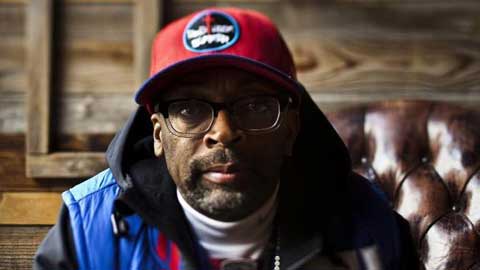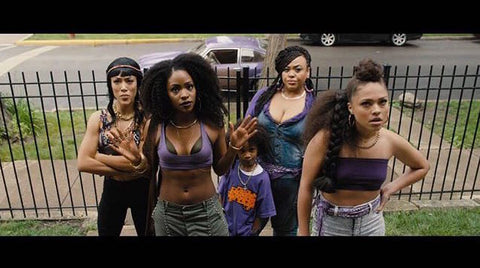Design of the Week | Chi-Raq

Spike Lee gives you ample reasons to dislike his new movie, Chi-Raq, most notably the heavy-handedness with which the director and co-writer drives home his message. I imagine that most viewers fall into the same camp as Lee with regards to topical American issues such as racial inequity, gun control and responsibility, and the imprisonment of the poor. No matter how stirring John Cusack's performance is, Lee's not winning over skeptics because of delivery. It would have been much easier to digest if these talking points were seamlessly embedded within a narrative rather than as statistics shouted from a pulpit, literally.
But what I love about most all Spike Lee joints are these postmodern flourishes that feel very French New Wave. In this particular film it's the flashing "This is an Emergency" titlecard, the chorus, or the narrator Dolmedes played by Samuel L. Jackson. This is a tragedy, after all.

There is something of a disjointedness to many of Lee's works, as he jumps from character to character, or subject, but it all seems to be in creative service to the larger picture. In Chi-Raq, after introducing the circumstances effectively, we steer toward a more personal story, that of Lysistrata and her boyfriend, rapper Chi-Raq, the disaffected neighbor Miss Helen, and the grieving mother, Irene. The story then pans out to almost amateurish satire as Lysistrata and her crew seize control—without use of force or weapons—of an armory from a crusty old Johnny Reb general, and an out-of-touch white mayor dresses as a pharoah in the bedroom. These last scenes mentioned feel like sketches ripped from Saturday Night Live.
Chi-Raq feels exceptionally of-the-moment, with the character of Lysistrata on the roof of an armory shouting the names of the victims we all know now, that we associate with horror and suffering and the puzzlement for the lack of accountability in the aftermath. But it's more than a recitation of names; it's the urgency and energy, and direct approach as Lee grapples with some of the great ongoing issues of our time that in the end make it hard for me to fault Lee for heavy-handedness. Because it's necessary.

The performances by all of the female leads—Teyonah Parris as Lysistrata, Angela Bassett as Miss Helen, and Jennifer Hudson as Irene—were tremendously affecting, and I felt (in my humble non-Academy voter's opinion) award-worthy.


Comments